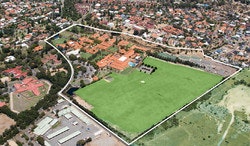Year 12 Chemistry 3AB
Overview
This course applies the basics required taught in the Stage 2 Chemistry course. This course covers; Macroscopic Properties, Atomic Structure and Bonding, Reaction Rates, Acids and Alkalis, Energy Changes, and Chemical Reactions including Equilibria, Redox and Organic Chemistry. Particular relevance is made of the chemistry of electrochemical cells and the application of organic reactions in the alcohol industry.
Topics
Unit 3A:
The focus for this unit is chemical processes. A sustainable chemical industry is important to the well-being of an industrialised society. Industry is concerned with getting the maximum yield and the optimum rate of production at the lowest cost. While the industrial production of substances or materials often uses reactions and conditions that cannot be replicated in a school laboratory, students explore how chemists achieve an economically viable rate of production by manipulating the factors that influence the rate of reaction and exploiting Le Châtelier's Principle. They also appreciate how chemists maintain appropriate levels of health and safety, protect the environment and enhance our health and lifestyle by applying their knowledge of chemistry to materials in industrial processes.
Unit 3B:
The focus for this unit is chemistry and modern lifestyles. Students explore how buffers play an important role in both biological and industrial processes. Such examples include the carbonic acid hydrogen carbonate buffering of blood plasma or the calibration of pH meters. Students examine the relationships between chemistry, industry and modern lifestyles e.g. the development of portable power supplies (batteries) for laptop computers, portable MP3 players and hearing aids or fuel cells used in electric buses and space craft. They gain an appreciation of the enormous range of organic compounds with diverse physical and chemical properties that are determined by the functional group attached to an organic molecule. Students also explore an important industrial, environmental or biological process associated with the context or contexts. This study is multi-faceted, and includes laboratory work as well as students exploring ways that chemists assist in monitoring and controlling processes in the environment, highlighting links to the importance of chemistry to society.
Assessments
Seven end of topic tests: 15% | Four Practical Assessments: 20% | Two Reports (assignments): 10% | Homework Assignments: 15% | Two end-of-semester examinations combined: 40%
Reporting
A brief interim report on class work and behaviour will be issued towards the end of Term 1. The achievement for each unit will be reported as a College A - E grade as well as a percentage mark for the unit and an examination mark. In addition, the student's approach to class work and behaviour will be reported via the usual key performance indicators.
Student Expectations - Homework
Homework marks contribute to the final score and form an important means of making a formative assessment of student understanding. In Year 12 most HW tasks will take the form of past paper questions in order to prepare for the WACE examination. To facilitate timely feedback, the homework's will be marked and returned within 2-3 lessons. For this reason, students are to ensure that they meet the deadlines as late submissions will be marked down severely.
